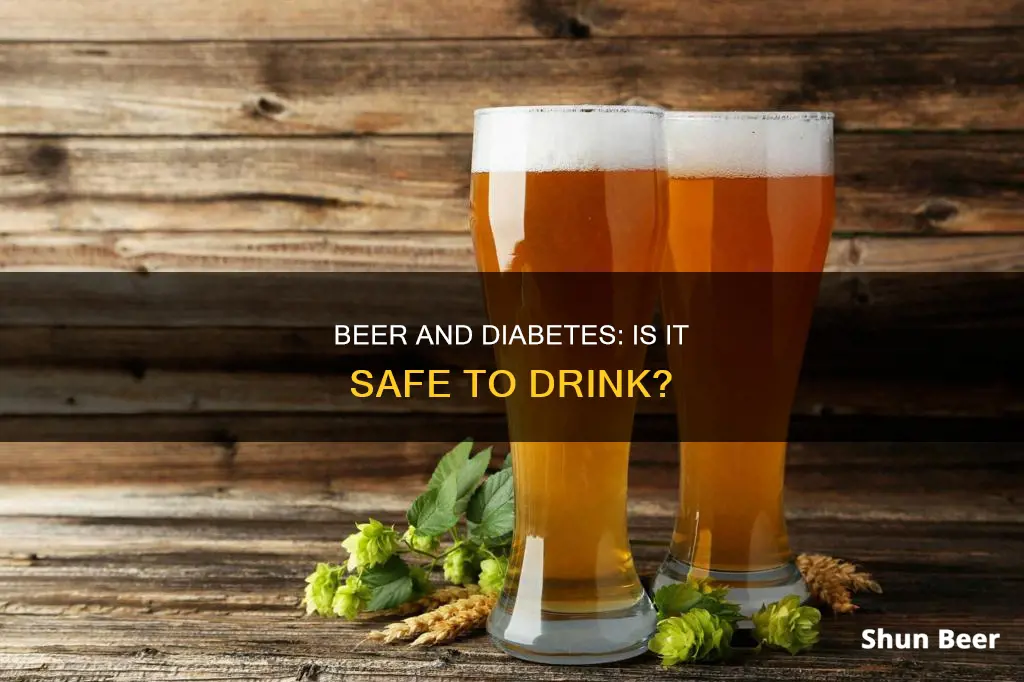
People with diabetes do not need to abstain from alcohol, but they should be mindful of how it can affect their body. Beer is a significant source of carbohydrates, so it can impact blood sugar levels. It can also be high in calories, which may contribute to weight gain over time. Additionally, the liver's priority is to clear alcohol from the body, so drinking alcohol can slow down carb metabolism, potentially leading to low blood sugar or hypoglycemia. Therefore, it is essential for people with diabetes to be cautious when consuming beer and other alcoholic beverages.
| Characteristics | Values |
|---|---|
| Can sugar patients drink beer? | Yes, but in moderation. |
| Recommended amount | No more than one drink a day for women and up to two drinks a day for men. |
| How to drink beer safely as a diabetic | Drink beer with food, not on an empty stomach. |
| Choose light beers with lower calories and alcohol content. | |
| Avoid mixing beer with sugary drinks. | |
| Monitor blood sugar levels before, during, and after drinking. | |
| Consult a doctor if you are taking medication. |
What You'll Learn
- Beer and sweet wine contain carbohydrates and may raise blood sugar
- Alcohol stimulates appetite, which may affect blood sugar control
- Alcohol may affect judgement, causing poor food choices
- Alcohol can interfere with diabetes medication
- Alcohol may cause flushing, nausea, increased heart rate, and slurred speech

Beer and sweet wine contain carbohydrates and may raise blood sugar
Beer is typically higher in carbohydrates than other alcoholic drinks like wine or liquor. The carb content of beers varies depending on the type of beer. "Light" beers have the fewest carbs, usually five grams or less per serving, and are also lower in alcohol content. Hoppy craft beers like IPAs and stouts tend to be much higher in carbs, with 15 grams or more per serving. They also tend to be higher in calories and alcohol, so it's best to stick to just one serving.
A can of beer typically contains about 150 calories. But because of its low alcohol content, people often end up drinking several glasses of beer in one sitting, consuming almost 600 calories. These empty calories don't provide your body with proteins, fats, minerals, or vitamins. Since a can of beer has about 15 grams of carbohydrates, four cans come to about 60 grams of carbs. Beer also tends to be consumed with snacks like peanuts or chips, which further increases the calorie and carbohydrate intake.
Sweet wines, such as sweet sherries, sweet wines, and liqueurs, also contain significant amounts of carbohydrates and should be limited.
To minimise the impact of beer or sweet wine consumption on blood sugar levels, it is recommended to:
- Drink in moderation.
- Avoid drinking on an empty stomach.
- Pair alcoholic beverages with low-carbohydrate snacks.
- Choose light beers, which have a lower calorie and carbohydrate count.
- Pace yourself and drink water between alcoholic beverages.
- Monitor your blood sugar levels regularly before, during, and after drinking.
Drinking Beer on Rhode Island's Beaches: What's Allowed?
You may want to see also

Alcohol stimulates appetite, which may affect blood sugar control
Alcohol can increase appetite and energy intake, which may affect blood sugar control. While the effect of alcohol on appetite is largely unsubstantiated, its effect on energy intake is significant. Alcohol is more energy-dense than carbohydrates or protein, with 7 kcal of energy per gram. Alcoholic drinks can contain a significant number of calories, and studies have shown that an average adult can get up to 10% of their daily caloric intake from alcohol.
Alcohol can affect energy intake in several ways. Firstly, it can make us feel hungrier, but only once we start eating. Studies have shown that participants who ingested alcohol before a meal reported increased hunger ratings once they had started eating. However, their hunger ratings before the meal were not affected by alcohol consumption. Secondly, alcohol can reduce the feeling of satiety or fullness after eating. This is supported by a 2001 study that found that alcohol inhibits the secretion of leptin, a hormone that inhibits hunger and makes us feel full. On the other hand, a 2005 study found that alcohol decreased the amount of ghrelin, known as the "hunger hormone," in the blood. Therefore, the effects of alcohol on fullness are likely complex and multivariable.
Additionally, calories from alcohol do not contribute to the same fullness feelings as calories from other macronutrients. Studies have found that participants did not naturally modulate their eating habits to account for the calories consumed from alcohol. As a result, the calories from alcohol can easily be additive to the calories from our regular diets, leading to excess energy intake and weight gain.
The effect of alcohol on appetite and energy intake can be influenced by various factors, such as drink choice, drink frequency, binge drinking, sleep quality, dietary nutrition, and history of eating disorders. More research is needed to fully understand the mechanisms by which alcohol leads to increased calorie consumption and its effect size. However, the evidence suggests that alcohol can stimulate appetite and increase energy intake, which may have implications for blood sugar control, especially for individuals with diabetes.
The Fizziness in Beer: How Carbonation Works
You may want to see also

Alcohol may affect judgement, causing poor food choices
Alcohol can affect the brain and body in complex ways, altering one's behaviours and leading to negative outcomes. Even low doses of alcohol have effects on memory and can impair judgement. This impaired judgement can lead to poor decision-making, such as engaging in risky behaviours, including violent or aggressive behaviours, and driving under the influence.
Alcohol can also affect one's ability to think, plan, and reasonably evaluate situations, which can lead to increased sexual risk-taking. For example, alcohol can impair one's judgement to the point where an unambiguous message of "no interest" for sexual behaviour could be misinterpreted or ignored, resulting in sexual assault.
Additionally, alcohol can disrupt normal brain functioning, making one more likely to engage in violent or aggressive behaviours. This can include situations where a person who wishes to engage in a violent act may drink to increase their courage to complete the act or with the intention of using alcohol as an excuse for their actions.
Alcohol can also impair judgement when it comes to food choices. For individuals with diabetes, drinking alcohol may affect blood sugar levels and interact with diabetes medications. Alcohol can cause hypoglycaemia (low blood sugar) and interfere with the liver's ability to produce glucose, especially when blood sugar is already low. This can be dangerous, and individuals with diabetes should monitor their blood sugar levels before, during, and after drinking.
To minimise the impact of alcohol on blood sugar levels, it is recommended to avoid drinking on an empty stomach and to consume food while drinking. Choosing low-carbohydrate snacks or light beers with lower calorie counts can also help. It is also important for individuals with diabetes to monitor their blood sugar levels regularly and follow their doctor's recommendations regarding alcohol consumption.
In summary, alcohol can impair judgement and affect decision-making, including food choices. For individuals with diabetes, it is crucial to be aware of the potential risks and take appropriate measures to minimise the impact of alcohol on their blood sugar levels.
Beer and Baseball: Should They Mix?
You may want to see also

Alcohol can interfere with diabetes medication
The liver's main function is to store glycogen, which is the stored form of glucose and is used to regulate blood sugar. When you drink alcohol, your liver has to work to remove it from your blood instead of regulating blood sugar. This is why you should never drink alcohol when your blood glucose is already low. Alcohol also impairs your liver's ability to produce glucose, so it is important to know your blood glucose number before consuming an alcoholic beverage.
Drinking alcohol can cause hypoglycemia, where your blood glucose level drops, within a few minutes of consumption and for up to 12 hours afterward. It is important to check your blood glucose level after consuming alcohol to make sure it is in the safe zone and eat a snack if your blood glucose is low. Drinking alcohol can make you feel dizzy, sleepy, and disoriented—similar symptoms to hypoglycemia. It is important to wear a medical ID bracelet to alert others to your diabetes, so they know that your symptoms could be caused by hypoglycemia.
The amount of alcohol considered safe for people with diabetes varies depending on the person and their health condition but generally, women should have no more than one drink per day and men should have no more than two drinks per day. It is important to drink in moderation and follow your doctor's recommendations.
Liver Transplant and Alcohol: Is Drinking Beer Safe?
You may want to see also

Alcohol may cause flushing, nausea, increased heart rate, and slurred speech
People with diabetes do not need to cut alcohol out of their diet. In fact, studies suggest that light drinking (no more than one to two drinks a day) may be beneficial to diabetes. However, it is important to consider the effects of alcohol on blood sugar levels. Alcohol competes with the liver's ability to produce glucose when blood sugar is low, which can lead to dangerously low blood sugar levels.
Drinking alcohol may cause flushing, nausea, increased heart rate, and slurred speech. These symptoms are due to a reaction to the accumulation of acetaldehyde, a metabolic byproduct of alcohol catabolism. This reaction is more common in people of East Asian descent, with a prevalence of 30-50% in Chinese, Japanese, and Korean populations. The condition is characterised by facial flushing, nausea, headaches, and a fast heart rate.
To prevent flushing, it is recommended to eat before drinking alcohol and to limit consumption to one drink per hour. Additionally, drinking water between alcoholic beverages can help flush out the acetaldehyde. Flushing due to acetaldehyde buildup is also associated with an increased risk of oesophageal cancer in drinkers.
Nausea caused by drinking alcohol is the body's way of ridding itself of the toxin. Vomiting may occur when the body cannot process the amount of alcohol consumed, or due to irritation of the stomach lining. It is important to stay hydrated and rest after drinking to alleviate nausea and other hangover symptoms.
Mixing Beer and Benadryl: What You Need to Know
You may want to see also







